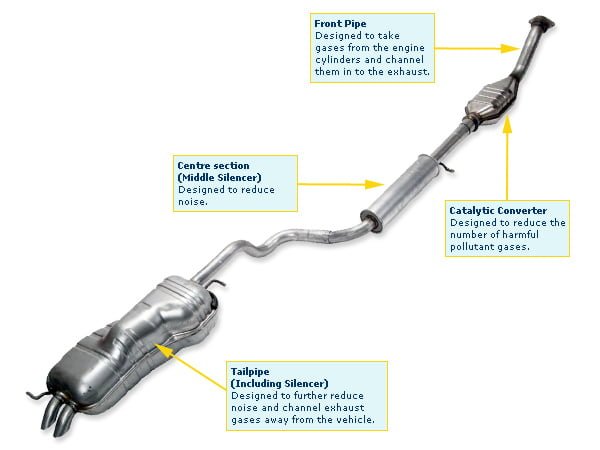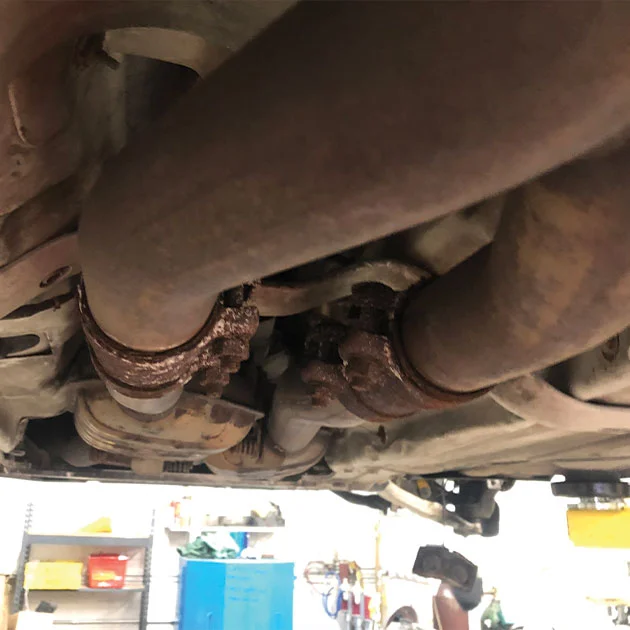Exhaust leaks, while seemingly inconspicuous, can have a significant impact on the overall performance and safety of a vehicle. From the moment we turn on our engines, a complex system of pipes and components work together to expel harmful gases and create a smooth driving experience. However, in the midst of this intricate process, the occurrence of an exhaust leak can disrupt the harmony and compromise the overall functionality of the system.
But how does an exhaust leak happen? Picture this: under the hood of your car, a series of interconnected pipes carry the exhaust gases from the engine to the tailpipe, where they are released into the atmosphere. Over time, these pipes can become worn, corroded, or damaged due to a variety of factors such as heat, moisture, or road debris. As a result, gaps or cracks may form, allowing the exhaust gases to escape before they reach their intended destination. This not only leads to decreased fuel efficiency and engine performance but also poses potential health risks for both the occupants of the vehicle and the environment.
In this article, we will delve into the common causes of exhaust leaks, exploring the various factors that contribute to their occurrence. By understanding the root causes and potential warning signs, we can equip ourselves with the knowledge to identify, address, and prevent these leaks, ensuring a safer and more efficient driving experience for all. So, buckle up and join us as we embark on a journey through the intricate workings of vehicle exhaust systems and unravel the mystery behind the phenomenon of exhaust leaks.
An exhaust leak can occur due to various reasons, such as worn-out gaskets, cracked or rusted pipes, loose connections, or damaged mufflers. These issues can lead to gaps or holes in the exhaust system, allowing exhaust gases to escape before they reach the tailpipe. Additionally, extreme temperatures and vibrations can contribute to exhaust leaks. It is important to address exhaust leaks promptly as they can affect engine performance and pose potential health risks.

How Does an Exhaust Leak Happen?
Introduction
An exhaust leak is a common problem that can occur in a vehicle’s exhaust system. It can lead to various issues, including decreased engine performance, increased fuel consumption, and potential health hazards for the occupants of the vehicle. In this article, we will explore the causes and effects of an exhaust leak, as well as provide a step-by-step guide on how to identify and fix this issue.
Causes of an Exhaust Leak
There are several possible causes of an exhaust leak. One common cause is a damaged or deteriorated gasket. Gaskets are used to seal the connections between various components of the exhaust system, such as the exhaust manifold, catalytic converter, and muffler. Over time, these gaskets can wear out or become damaged, leading to leaks.
In addition to gasket issues, exhaust leaks can also occur due to corrosion or damage to the exhaust pipes themselves. Exposure to harsh environmental conditions, such as road salt or extreme heat, can cause the pipes to rust or develop holes. Similarly, accidents or impacts can result in physical damage to the exhaust system, leading to leaks.
Effects of an Exhaust Leak
An exhaust leak can have several negative effects on both the vehicle and its occupants. Firstly, it can cause a decrease in engine performance. The leak allows for the escape of exhaust gases before they have properly passed through the catalytic converter, resulting in reduced power and efficiency.
Furthermore, an exhaust leak can lead to increased fuel consumption. As the leak allows for the escape of exhaust gases, the engine may compensate by burning more fuel to maintain the desired power output. This can result in higher fuel costs and reduced overall fuel efficiency.
Identifying an Exhaust Leak
Identifying an exhaust leak requires a careful inspection of the exhaust system. The first step is to visually inspect the various components, such as the exhaust manifold, catalytic converter, and muffler, for any signs of damage or corrosion. Look for rust, holes, or loose connections.
In addition to visual inspection, you can also listen for any unusual noises coming from the exhaust system. A leak can often result in a distinct hissing or popping sound. If you suspect a leak but are unable to visually identify it, you may consider using a smoke test or seeking professional assistance.
Fixing an Exhaust Leak
Fixing an exhaust leak will depend on the specific cause and severity of the issue. In the case of damaged gaskets, they will need to be replaced. This typically involves removing the affected component, cleaning the mating surfaces, and installing a new gasket. It is important to ensure a proper seal to prevent future leaks.
If the leak is due to corrosion or physical damage to the exhaust pipes, repair or replacement may be necessary. Small holes can often be patched using exhaust repair tape or epoxy, while larger or more severe damage may require the replacement of the affected section of the exhaust system. It is recommended to consult a professional mechanic for complex repairs.
Maintaining a Healthy Exhaust System
To prevent exhaust leaks, it is important to maintain a healthy exhaust system. Regular inspections and maintenance can help identify and address any potential issues before they become major problems. Additionally, avoiding excessive exposure to harsh environmental conditions, such as road salt or extreme heat, can help prolong the life of the exhaust system.
Furthermore, it is crucial to address any warning signs or symptoms of an exhaust leak promptly. These may include decreased engine performance, increased fuel consumption, unusual noises, or the presence of exhaust fumes in the vehicle cabin. Ignoring these signs can lead to further damage and potential safety hazards.
Frequently Asked Questions
Here are some commonly asked questions about how an exhaust leak happens:
1. How does an exhaust leak occur?
An exhaust leak can occur when there is a break or hole in the exhaust system. This can happen due to corrosion, rust, or physical damage to the components of the exhaust system. Over time, the constant exposure to heat, moisture, and road salt can weaken the exhaust system, leading to leaks.
Additionally, improper installation or loose connections can also cause exhaust leaks. If the exhaust pipes, gaskets, or clamps are not securely attached, it can result in gaps or openings where exhaust gases can escape.
2. What are the common signs of an exhaust leak?
There are several signs that indicate the presence of an exhaust leak. One of the most noticeable signs is a loud, hissing or popping noise coming from the exhaust system. This noise is caused by the gases escaping through the leak.
Other common signs include a decrease in fuel efficiency, a noticeable decrease in engine performance, a strong smell of exhaust fumes inside the vehicle, and visible smoke coming from the exhaust pipe. If you notice any of these signs, it is important to have your exhaust system inspected and repaired as soon as possible.
3. Are there any health risks associated with an exhaust leak?
Yes, there are health risks associated with an exhaust leak. The exhaust gases contain harmful substances such as carbon monoxide, which is a colorless and odorless gas. When inhaled in high concentrations, carbon monoxide can cause symptoms such as dizziness, headaches, nausea, and even loss of consciousness.
Exposure to carbon monoxide can be especially dangerous in enclosed spaces, such as inside a vehicle with a leaky exhaust system. It is important to address an exhaust leak promptly to ensure the safety of yourself and your passengers.
4. Can an exhaust leak affect the performance of my vehicle?
Yes, an exhaust leak can have a significant impact on the performance of your vehicle. The leak can disrupt the proper flow of exhaust gases, which can affect the engine’s ability to expel waste gases efficiently.
This can result in a decrease in engine power, reduced fuel efficiency, and even engine misfires. It can also trigger the check engine light to illuminate on the dashboard. Getting the exhaust leak fixed can help restore the performance of your vehicle and prevent further damage to the engine.
5. Can I fix an exhaust leak myself?
While it is possible to fix a minor exhaust leak yourself, it is generally recommended to have a professional mechanic inspect and repair the exhaust system. Exhaust repairs can be complex, involving various components and specialized tools.
A professional will have the knowledge and experience to accurately diagnose the issue, identify all potential leaks, and perform the necessary repairs or replacements. This ensures that the exhaust system is properly repaired and prevents any further complications or safety risks.

Is your vehicle exhaust leaking? Mechanic hacks!
In conclusion, understanding how an exhaust leak can occur is vital for any vehicle owner. Whether it is due to a worn-out gasket, a cracked or corroded pipe, or a loose connection, an exhaust leak can have detrimental effects on both the vehicle and the environment. The potential dangers of carbon monoxide poisoning, decreased fuel efficiency, and damage to the engine cannot be overlooked. Therefore, it is crucial to regularly inspect and maintain the exhaust system to prevent leaks and ensure the smooth functioning of our vehicles.
Furthermore, it is important to remember that an exhaust leak is not only a mechanical issue but also an environmental concern. The harmful emissions released through an exhaust leak contribute to air pollution, which has far-reaching consequences for our health and the planet. By taking proactive measures such as routine inspections, promptly addressing any signs of a leak, and seeking professional assistance when needed, we can reduce the risk of an exhaust leak and minimize our impact on the environment. Let us all prioritize the health of our vehicles and the well-being of our surroundings by staying vigilant about exhaust leaks and working towards a cleaner and greener future.
